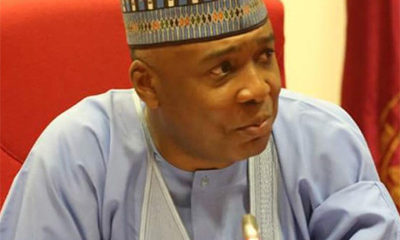News
State Governments Revenue To Be Strained over High Debt-To-Revenue Ratio

Eniola Olayemi
The revenue of the states in the country will be further strained in the coming months owing to their rising debt portfolio and cost of servicing those debts.
This is coming on the back of the latest report on the states’ internally generated revenue by the National Bureau of Statistics (NBS), tagged, “Internally Generated Revenue at State Level”, which showed a high debt to revenue ratio for the first half of 2018 (H1’18).
The report showed that total states’ Internally Generated Revenue, IGR, grew by 27.7 percent year-on-year (y/y) to N579.40 billion from N453.83 billion in H1’17.
Of the 36 states, 28 states grew their IGRs, while states such as Ebonyi, Anambra, Benue, Abia and Kebbi recorded declines in IGR by 21.79 percent to N2.46 billion, 21.62 percent to N7.07 billion, 18.86 percent to N6.06 billion, 12.29 percent to N6.98 billion and 10.85 percent to N2.03 trillion respectively in H1 2018.
Lagos retained its number one spot, with an IGR of N196.4 billion, up 16.9 percent y/y and Rivers State recorded N60.9 billion, the second largest state by IGR.
The report showed that not much changed in terms of revenue sources as federation account allocation inflows continued to account for more than 70 percent of the total revenue (FAAC + IGR) for most states. Net federation accounts allocation to states grew y/y by 65.14 percent to N1.23 trillion in H1 2018 from N0.74 trillion in H1 2017 amid increases in production and price of crude oil.
The states’ total debt stood at N4.78 trillion in the year under review, comprising of N1.30 trillion external debt and N3.38 trillion domestic debt.
The high debt to revenue ratio, according to economy watchers, will put more pressure on fiscal operation of the states and also make implementation of capital expenditure more difficult.
In his reaction, Mustapha Wahab, a research analyst at Cordros Capital Limited, explained that adding growing debt to servicing cost and to the already depressed state revenues will put pressure on their fiscal operation. He said: “Currently a number of states can’t cover their recurrent expenditures on the back of insufficient FAAC allocations despite gains from higher crude prices relative to last year and significantly low internally generated revenues.
“Adding growing debt service cost to the already depressed state revenues will further put pressure on fiscal operations of the federating units, the impact of which will not only make capital expenditure, CAPEX, implementation a tall order but overhead spending also.”
According to him, the situation would mean growing risk of default on interest and principle payment for the states. He urged the states to increase their IGR to reduce the impact of declining crude oil price. “With IGR to FAAC ratio remaining abysmally low, states government must ramp up internally generated revenues to reduce the impact of volatile oil earnings on fiscal performance by significantly expanding the tax base and considerably monitoring revenue generating state owned corporations to effectively block all loopholes,” he said.
Cowry Asset Management, a Lagos-based investment banking firm, said: “Given states’ IGR of N579 billion and net Federal Accounts Allocation of N1.23 trillion in H1 2018, ‘dependency multiple’, FAAC to IGR, was 2.13 times.
In spite of the y-o-y increases in IGR and net Federation Accounts Allocation to the states by 27.7 percent and 65.14 percent respectively, the states’ average total debt to gross revenue still remained high at 2.75 times in H1 2018.
“We opine that high debt to gross revenue ratios of the states would further increase their debt servicing costs which in turn would burden future generated income of the affected states going forward, given that most of the borrowed fund would have gone into recurrent expenses such as payment of salaries.”
In a report titled, “State of States IGR in H1’18: Creating more “Lagos” across Nigeria”, analysts at United Capital Plc, another investment banking firm, emphasised the need for the state to up their IGR in line with Lagos State while expressing concern at the underwhelming performance of other states.
They also pointed out the need to expand the revenue base across states, saying that it would reduce dependence on FAAC inflows, which is largely exposed to the vagaries of the oil market. Increasing the revenue base of the states, according to them, would limit future fiscal crisis. “In addition, this would boost the credit ratings of states and enhance their ability to finance developmental projects,” they said.
“Further analysis of the IGR report indicated that Pay As You Earn, PAYE, is two times the size of FAAC inflow in Lagos and 1.1 times in Ogun States, implying that both states are significantly benefiting from a dominant formal sector relative to other states. Hence, to create more “Lagos States” across the country, there is a need for a concerted effort to develop the formal sector in the rest of the country. Put differently, tax authorities in other states may need to find creative ways to boost revenue from the informal sector going forward,” they asserted.










